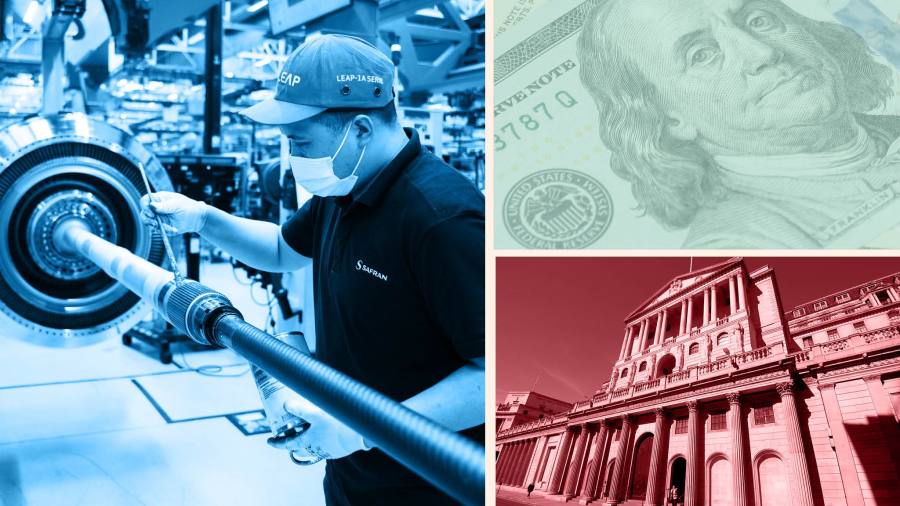[ad_1]
How resilient is the eurozone economy against new Covid curbs?
A widely tracked survey will on Wednesday shed more light on whether new restrictions to contain coronavirus infections in many European countries has begun affecting eurozone businesses.
The IHS Markit purchasing managers’ survey is expected to indicate a further slowdown in eurozone business activity in March, even though it has remained more resilient in recent months than when the pandemic first hit a year ago.
The PMI for eurozone services is expected to inch up to 46, according to a Reuters poll of economists, which would mean it remains below the key threshold of 50, indicating a majority of businesses are reporting a drop in activity.
The reading for eurozone manufacturing is expected to hold steady at 57.9, as the industrial sector shakes off supply chain disruptions.
Overall, the composite eurozone PMI, combining the two sectors, is expected to rise slightly to 49.1. This is down from the peak of 54.9 hit when an economic rebound started last July, but still above the record low of 13.6 at the peak of the initial coronavirus outbreak last April.
The uncertainty created by the pandemic and the measures to contain it are likely to be highlighted by the European Commission’s flash consumer confidence indicator for March, which is expected to dip slightly to minus 15, down from minus 14.8 the previous month. Martin Arnold
Will US inflation data deepen investor concerns?
Central bankers and Wall Street investors are pencilling in stronger inflation as economies rebound on the back of an accelerating global vaccination campaign and an additional $1.9tn in stimulus from the US government.
On Friday, investors will learn how much prices picked up in February with the release by the US Department of Commerce of the personal consumption expenditures price index — the Federal Reserve’s preferred inflation gauge.
Economists forecast a 1.5 per cent year-on-year rise in the core index that strips out volatile food and energy prices, according to Bloomberg. In January, the index rose by the same amount, still below the Fed’s long-term inflation target of 2 per cent.
Markets are already pricing in rising inflation for the coming months. The 10-year breakeven rate, a measure of investors’ inflation expectations, climbed as high as 2.34 per cent this week — the highest level since 2013.
The Fed, too, said last week that it expected inflation to rise to 2.2 per cent this year, increasing its previous estimate of 1.8 per cent from December.
Treasury markets have reacted to rising inflation fears with a dramatic sell-off since the beginning of the year. The yield on the 10-year note, which moves inversely to its price, crossed 1.7 per cent on Thursday, a 14-month high. Aziza Kasumov
Will UK inflation prove hard to contain?
Inflation in the UK is expected to exceed the Bank of England’s 2 per cent target later this year, driven by an easing of lockdown measures, higher shipping prices and rising energy costs.
However, at its policy meeting on Thursday the BoE kept its main rate at 0.1 per cent, the lowest level on record, and maintained the target for its bond-buying programme at £895bn, almost double its pre-pandemic level.
The central bank, which is anticipating a rapid vaccine-fuelled upswing for the UK economy in the second half of this year, said it did “not intend to tighten monetary policy†until clear evidence emerged of a recovery in the labour market and the 2 per cent inflation target could be achieved “sustainablyâ€.
Robert Wood, UK economist at the Bank of America, expects inflation to remain unchanged when February’s consumer price index level is released by the Office for National Statistics on Wednesday. In January, the price of consumer goods rose at a year-on-year rate of 0.7 per cent — a three-month high.
Wood predicts that level will rise to 2.5 per cent later this year “as energy price rises feed through the economyâ€. The price of Brent crude, the international oil benchmark, is up more than 60 per cent since early November.
Ahead of last week’s meeting, members of the BoE’s monetary policy committee expressed differing views on the medium-term inflation outlook.
Andy Haldane, its chief economist, said there was a “tangible risk†that UK inflation would prove to be “more difficult to tame†than policymakers expected, while Jonathan Haskel, an external member, saw “little risk of sustained above-target inflation†given the temporary nature of the factors that were expected to push prices. Valentina Romei

[ad_2]
Source link





